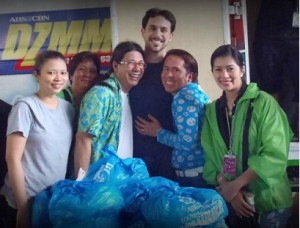By PABLO A. TARIMAN
 A little over a month before the opening of the season concerts of the Philippine Philharmonic Orchestra (PPO), CCP’s resident music director Olivier Ochanine is busy studying scores for Shostakovich’s Jazz Suite No. 2, Nielsen’s Incidental music to Aladdin and Rachmaninov’s Symphonic Dances.
A little over a month before the opening of the season concerts of the Philippine Philharmonic Orchestra (PPO), CCP’s resident music director Olivier Ochanine is busy studying scores for Shostakovich’s Jazz Suite No. 2, Nielsen’s Incidental music to Aladdin and Rachmaninov’s Symphonic Dances.
But at the height of the monstrous monsoon rains this week, Ochanine made a quick intermission from music scores and decided to volunteer in relief and rescue operations.
The orchestra conductor and his Filipino wife are no strangers to disaster relief operations. They were also in Cagayan de Oro and Iligan City last year to help flood victims.
“Ever since our experience in Cagayan de Oro and Iligan City helping out victims of Typhoon Sendong, I’ve been waiting and waiting for the chance to once again go ‘into the trenches’ and do whatever is possible to assist people as they experience Mother Nature’s wrath,” wrote Ochanine in his personal account chronicling “17 hours of confusion” in the relief operations front.
Ochanine took over the leadership of the national orchestra in early 2010 just a year after storm Ondoy. Born in Paris, he studied flute in Germany and the US and has resided in Los Angeles, where he was an avid music educator and freelance conductor.
And so while Metro Manila was reeling from heavy afternoon downpour last Wednesday, Ochanine and his wife reported to the MMDA Flood Control center at EDSA and Guadalupe.
Ochanine recounted: “We have been told this is going to be a full rescue operation, and, naturally, I was very eager to help, since that was exactly the type of work I have been yearning to do since our efforts in Mindanao. This time, we will not just be feeding the victims. This time we will be assisting during the disaster and we will be dealing with the real-time circumstances, which for me is too good to resist.”
They were told that they will be deployed within half an hour and so they quickly ran to a nearby convenience store to buy whatever little food they can get as they were a little hungry. With them were a couple couple dozen rescuers from the MMDA, a nurse who is vacationing from the Middle East.
 “I quickly become labeled the ‘import’ by the rather burly head of the MMDA mission, as I am the only white rescuer there for the time being,” the PPO conductor related.
“I quickly become labeled the ‘import’ by the rather burly head of the MMDA mission, as I am the only white rescuer there for the time being,” the PPO conductor related.
That expected 4 p.m. appointment with flood victims last Wednesday didn’t happen and they still waited for orders until 10 p.m. “By that time, we are already very tired, and I am starting to feel very hungry. The good news was that food was delivered from Jollibee and we are able to feel a little more energy ahead of the mysterious deployment that seems never to want to come.”
They had no choice but to wait and watch the television reports.
Ochanine noticed a strange reaction from the MMDA chief of mission: “We were actually surprised to see the ‘chief’ of the MMDA mission snicker with his buddies about the Army’s efforts to rescue the poor victims of the Commonwealth landslide. Some of the MMDA have been at the landslide earlier that day to help out as well, and they apparently think it is hilarious that the Army men were wearing life vests. I am taken aback because I suddenly realize that this effort seems to be trivialized into some sort of competition between the various groups as opposed to genuinely caring for the rescue of victims. I think to myself: ‘Maybe they just need some comic relief from their very tiresome day in the flood zones and maybe they are not really competitive.’”
As they were about to go home after six hours of waiting, they were told that the rescue operations would commence and they rushed back to the MMDA Flood Control Center. They were told to join a truck with a large rubber boat and with some rescuers hanging from the sides of the vehicle. They proceeded to Quezon City Del Monte area and on to Roosevelt where they saw massive flooding and where they saw other trucks under water.
They unloaded the rubber boat but never got briefing on what to do. What followed was another long wait as they saw the waters rise with more heavy rains. Then they were asked to follow a rescue mission on a family asking help from the third floor of their house. Unloading the huge heavy rubber boat, he realized that load could be damaging on his cervical disc problem.
“Will we be rescuing people tonight at the cost of my career?” he pondered.
As they rested in a gasoline station, they heard some cries for help. They were disappointed when they were told they could not assist because they were sent to the wrong assigned area. To make things worse, they were told that the stranded inhabitants they were supposed to rescue had already been picked up by another group of rescuers.
There was no word from the leader of the rescue operations and Ochanine and wife went home taking the next available jeepney as the truck they used going to the area was nowhere to be found.
“I can confidently say that today was both one of the most exhilarating, memorable and eye-opening as well as one of the most disheartening, embarrassing and sad experiences of my life,” Ochanine said after his volunteer effort yielded negative effort. “It’s far from easy to pass by flood victims and have to refuse to help them. It’s much harder even to accept this when you have in fact failed in rescuing those whom you have set out to rescue.”
After experiencing 17 hours of waiting and watching chaos and disorder in the relief and rescue operations of the MMDA, Ochanine and his wife joined the DZMM/ABS-CBN relief operations in Novaliches and Marikina and highly relieved that they were finally able to help.
He admitted in his Facebook posting: “I have to say that rowing a rubber boat on Araneta Avenue in total darkness and 1.5 meters of water while hearing voices calling for help was one of the most eerie experiences of my life.”